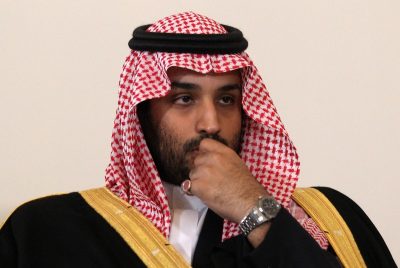Saudi Arabia: Who’s Really Trying to Overthrow King Mohammed Bin Salman?

Saudi Arabia arrested between 16-30 people in a broad crackdown across the Kingdom.
According to reports, this is different than the many other times that it happened because the latest incident includes a wide variety of seemingly disparate individuals such as clerics, a journalist, and even a prince, and comes amid a flurry of speculation that King Salman is considering abdicating in favor of the young Crown Prince Mohammed Bin Salman. Critics claim that this is being undertaken in order for Salman’s successor to preemptively consolidate power in staving off any unrest that might result from his possibly imminent ascent to the throne, while the government says that it was actually dismantling a foreign intelligence network linked to the Muslim Brotherhood and Houthis.
Riyadh’s assertions are a thinly veiled euphemism to suggest that Qatar and Iran are behind this shadowy regime change plot, but it’s very unlikely that either of them is involved, and Riyadh may have just said they were in order to diplomatically deflect attention from the true culprit.
Here’s why.
Iran and Qatar are close with Russia and China, and the latter two Great Powers are actually enjoying a renaissance of relations with Saudi Arabia right now. While one might expect this to make Tehran and Doha jealous, the opposite is true – Moscow and Beijing’s developing high-level strategic partnerships with Riyadh are designed to bring balance to the Mideast by weaning the Kingdom away from Washington and slowly but surely integrating it into the emerging Multipolar World Order, which will never be perfect or without friction, but is still a step in the right direction. In order to appreciate what’s happening, one needs to be reminded of a few things that have happened this past year when it comes to Saudi Arabia’s relations with Russia and China.
Concerning Moscow, Riyadh agreed to an historic OPEC output deal with Russia last year and renewed it a few months ago after it expired. The Saudis are also cooperating with the Russians in encouraging Syria’s so-called “opposition” to merge into a unified entity for facilitating peace talks with Damascus. Foreign Minister Lavrov was just in the Kingdom last week, and King Salman is expected to visit Moscow sometime next month. As for China, Beijing signed a total of over $110 billion of deals with Saudi Arabia in the past six months alone in an effort to assist the Crown Prince’s ambitious Vision 2030 program of economic modernization. It’s that initiative more so than anything else which holds the danger of inadvertently destabilizing the country’s internal affairs because of the opposition that it’s come under from some of Saudi Arabia’s many radical clerics who are against the social consequences of its reforms.
Bearing all of this in mind, it’s worthwhile to revisit the question of who has an interest in destabilizing Saudi Arabia right at the moment that it’s turning away from the US and towards Russia and China, timing their subversive efforts to coincide with a prolonged leadership change and an economic transition. By all indicators, those aren’t the hallmarks of an Iranian or Qatari operation, but the red flag for an American one.
The post presented is the partial transcript of the CONTEXT COUNTDOWN radio program on Sputnik News, aired on Friday Sep 22, 2017:
Andrew Korybko is an American Moscow-based political analyst specializing in the relationship between the US strategy in Afro-Eurasia, China’s One Belt One global vision of New Silk Road connectivity, and Hybrid Warfare.

